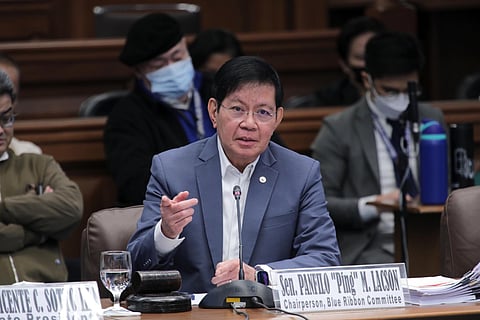
- NEWS
- the EDIT
- COMMENTARY
- BUSINESS
- LIFE
- SHOW
- ACTION
- GLOBAL GOALS
- SNAPS
- DYARYO TIRADA
- MORE

Senate President Pro Tempore Panfilo Lacson said on Monday that while budget insertions weren’t inherently illegal, many lawmakers had abused them for personal or political gain.
“Introducing insertions is not illegal. It is our mandate as lawmakers to review the National Expenditure Program and propose amendments. The problem is that many lawmakers abused this mandate,” Lacson said in English and Filipino.
“I hope that in 2026, we will practice self-restraint. The people are angry, so we must reform the way we pass the budget,” he added.
Lacson noted that Senate insertions alone for the Department of Public Works and Highways (DPWH) totaled over P100 billion to fund infrastructure projects, including for flood control. The House insertions, he said, were even larger.
“Much, much more,” he remarked, noting that the House document listing the members who made insertions was like a “roll call.”
He also flagged a possible collusion: “The DPWH received such massive insertions because many lawmakers were likely in collusion with corrupt DPWH officials to carve out huge kickbacks — even if it meant giving the DPWH a bigger budget than the education sector, which violates the Constitution.”
Lacson said that while many insertions were tagged “For Later Release,” delays could affect the economy because vetted projects might not get timely funding.
“The Senate must lead the way in ensuring transparency in budget deliberations, especially during individual amendments in plenary,” he said.
Sotto: Insertions part of process
Senate President Vicente “Tito” Sotto III echoed Lacson but stressed that insertions were part of the regular budget process.
“It is unfortunate that issues like ghost projects and failed flood control projects make all amendments seem illegal or improper,” Sotto said.
“Some of these amendments are for additional classrooms, farm-to-market roads, and bridges that benefit our people, especially in far-flung provinces. Some were never funded and were tagged ‘for later release,’” he added.
Senator JV Ejercito also clarified that amendments weren’t inherently bad.
“One of our tasks is to introduce amendments after budget hearings to support and improve programs and projects. Amendments are not tainted as long as there is no post-enactment intervention,” he said.
Lacson had earlier said that while amendments themselves weren’t illegal, massive insertions — sometimes as high as P9 billion — were questionable and could divert funds from properly planned local infrastructure programs.
